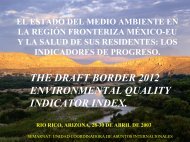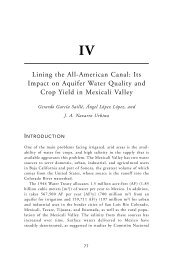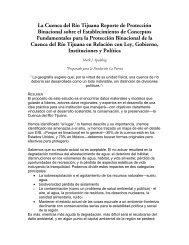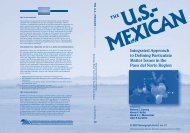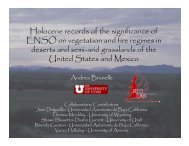Entire Book - Southwest Consortium for Environmental Research ...
Entire Book - Southwest Consortium for Environmental Research ...
Entire Book - Southwest Consortium for Environmental Research ...
You also want an ePaper? Increase the reach of your titles
YUMPU automatically turns print PDFs into web optimized ePapers that Google loves.
Designing a Transborder Trading Scheme<br />
emissions associated with new production meet preset standards, a<br />
firm does not have to purchase new permits to increase output. But<br />
this means a firm can increase emissions, which imposes costs on<br />
society, without themselves incurring costs. Thus, individually and<br />
collectively, firms have an incentive to both produce and emit more<br />
than is socially optimal.<br />
The existence of market power influences the optimal allocation<br />
of permits. When emission markets are competitive, the initial allocation<br />
of permits is irrelevant to efficiency because trading will continue<br />
until permits are optimally allocated (Montgomery 1972).<br />
However, when one firm gains a significant share of the market so<br />
that it can influence prices, markets will no longer allocate permits<br />
correctly because the monopolist will withhold some permits from<br />
the market to drive up the price. This adverse outcome can be mitigated<br />
by allocating permits equal to the optimal permit distribution<br />
that would arise under competition (Hahn 1984). Of course, if regulators<br />
know the optimal allocation, permit markets are hardly necessary.<br />
Still, to the extent that regulators can approximate the<br />
optimal allocation, then matching the initial allocation to this will<br />
improve market per<strong>for</strong>mance.<br />
Closely related to the initial allocation of permits <strong>for</strong> a cap-andtrade<br />
regime is determining the baseline <strong>for</strong> a baseline-and-trade<br />
regime (Brown and Walker 2003). Baselines can be based on exogenous<br />
factors or on output. Because baseline-and-trade schemes are<br />
not universal in their coverage, auctions are not relevant. After all,<br />
an emitter could avoid incurring the cost of purchasing permits in<br />
an auction simply by refusing to participate. The pros and cons of<br />
grandfathering and output-based allocations outlined in the context<br />
of cap-and-trade are relevant to the determination of baseline.<br />
Despite its drawbacks, the most commonly used methodology <strong>for</strong><br />
determining a baseline is grandfathering. Alternatively, one could<br />
establish a single baseline <strong>for</strong> an entire industry. This has the advantage<br />
that, once established, the baseline could be applied to all firms<br />
in the industry. The problem is that it may result in a standard that<br />
is too strict, making it difficult <strong>for</strong> firms not using cutting-edge<br />
abatement technology to make improvements that actually generate<br />
emission credits. This, there<strong>for</strong>e, makes an emissions trading program<br />
non-operational. A third approach would be to establish a<br />
111





